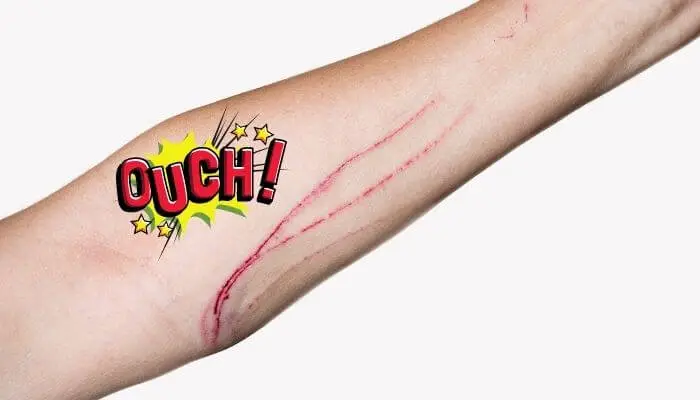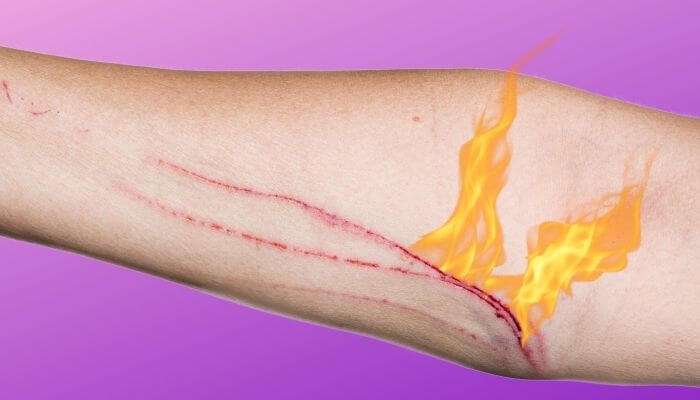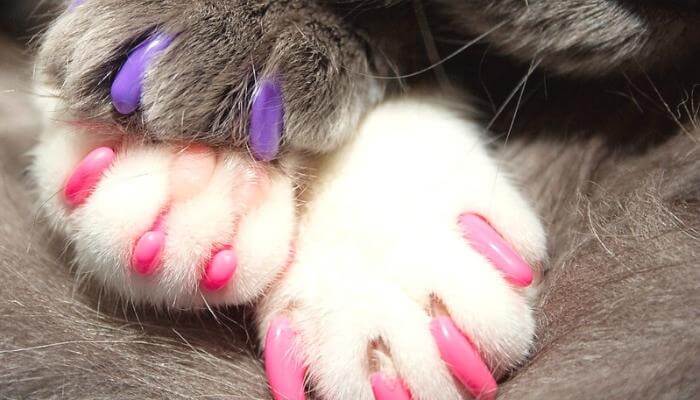Cat scratches burn for a number of reasons; cat claws are sharp, dirty and cause a shallow scratch that does not bleed.
This exposes the tissue to air which stings and burns more than a deeper cut that bleeds.
As the scratches are shallow they are rarely significant enough to cause the body to release pain-suppressing endorphins so it may feel like the scratch is more painful than other wounds despite the small size.
A typical scratch will sting but if you feel a lot of burning, itching, and discomfort it may be a sign of an allergic reaction or a bacterial infection such as Cat Scratch Disease.
Seek medical advice if you are experiencing a bad reaction to a cat scratch.
Contents
Why Do Cat Scratches Itch?
A scratch that is healing is often itchy as the body has started to treat and heal the wound.
During the healing process, the skin cells and nerves around the scratch are stimulated as the body fights off infection and prevents bacteria from getting into the wound.
This can cause itching but it’s best not to scratch as it can slow down the healing.
While itching is normal during healing, excessive itching and the appearance of small, itchy bumps may be a sign of an allergy or bacteria infection.
How To Stop Cat Scratches From Itching
Cleaning the scratch and applying a cream or ointment can help to stop the itching while the scratch heals.
- Eurax 10% Cream is fast-acting and long-lasting relief from itchy and irritated skin caused by skin conditions, allergies and stings
- Rapid relief from itchy and irritated skin for up to 8 hours
- Active ingredient Crotamiton relieves itching from allergic rashes, eczema and dermatitis
- For relief of itching and skin irritation caused by: Itchy dermatitis, Dry eczema, Allergic rashes, Hives, nettle rashes, Chickenpox, Insect bites and strings, Heat rash, Sunburn, Personal itching
- Non-greasy and non-staining
Keeping the area moisturised and itching as little as possible will help.
When trying to stop the itching make sure you don’t scratch!
Giving in to temptation and scratching the area will only provide very temporary relief and will make the itching and pain worse in the long run.
There are also anti-itch ointments that can help if you are finding it very difficult to ignore the itchiness.
Why Do Cat Scratches Puff Up?
Cat scratches sometimes swell up which is typically the body responding to skin damage.
Although most scratches are only superficial, the body needs to respond to fight off infection and heal the wound.
Some scratches may puff up more than others and this can happen if the scratch is deeper or if the scratch is becoming infected.
A minor scratch may puff up slightly but will heal quickly.
However, there is also a risk of developing an infection so if the swelling worsens or there are other symptoms you may need to seek medical treatment.
Why Do Cat Scratches Hurt So Much?
A cat scratch is painful because it is shallow and there is often no blood drawn.
The blood can help act as a barrier to protect the tissue that is exposed.

Without this, the tissue is exposed to the air and is a lot more painful.
This can result in a burning sensation and causes a lot of pain for a little scratch.
The other reason cat scratches seem to hurt more than other scratches and wounds is that your body doesn’t release any pain-suppressing endorphins because the scratch is minor, this can make the experience more painful than you think it’ll be.
What To Do If You’re Allergic To Cat Scratches
If you have cat allergies then you may also be hypersensitive to cat scratches.
This means you may experience increased symptoms when scratched including:
- Swelling
- Itchiness
- Headache
- Fever
- Reduced Appetite
- Exhaustion
The scratch may also look more inflamed and often develops small, itchy bumps on and around it.
The severity of allergies varies from person to person which means the symptoms can vary considerably too.
If you have severe allergies, you should seek medical advice immediately.
If you have been scratched by a cat and are experiencing an allergic reaction, you may want to take an antihistamine to help stop the reaction and reduce some of the swelling.
Always contact your doctor immediately for advice and treatment.
How To Heal A Cat Scratch:
Healing a cat scratch is like healing any kind of scratch.
The wound needs to be cleaned, treated with antibiotic ointment and left alone to heal.
1. Wash The Scratch
The first thing to do is wash the scratch with soap and water.
Be thorough but don’t scrub the area as this can cause more pain and further damage to the skin.
Instead, use running water to make sure the wound has been cleaned.
Cleaning the scratch and keeping the area clean is vital to help prevent bacteria.
2. Apply Antibiotic Cream
Once clean, apply antiseptic or antibiotic cream to the wound.
This will help to soothe any burning, stinging, and itching and will help the wound to heal.
The cream helps to keep the scratch moist and creates a barrier that protects against germs and dirt.
3. Cover The Scratches (If Necessary)
The scratches only need to be covered with a sterile dressing if they are on part of the body that is susceptible to dirt or friction.
A scratch will heal well if left uncovered as long as it isn’t constantly rubbed or exposed to bacteria.
4. Keep The Wound Clean & Watch For Signs Of Infection
With the wound now clean and treated, you need to leave it alone to heal.
Don’t scratch it or pick at any scabs and don’t let your cat touch or lick the wound either as this will expose the wound to bacteria increasing the risk of infection.
Over the next couple of weeks, keep an eye on the wound to make sure it heals properly.
5. Seek Medical Advice If There Are Signs Of Infection/ An Allergic Reaction
Some people experience an allergic reaction to a cat scratch.
If you notice severe reactions including inflammation, swelling, itchiness, raised bumps, etc. then you need to seek medical advice immediately.
You should also seek medical advice if you notice redness, increased pain, or discharge around the wound or if the wound has not started to heal after a few days.
Why Do Cats Scratch Humans?
There are many reasons a cat may scratch a human; it may be accidental, playful, an act of fear, aggression or redirected aggression.
If your cat is suddenly acting more aggressive than they usually are it could be a sign of a health issue.
Accidental
Accidents happen and your cat may scratch you without meaning to for example, when they climb up onto your lap.
There’s not much you can do about these situations but fortunately they rarely happen.
Playful
Your cat or kitten may have picked up the bad habit of scratching and biting your hands during playtime from when they were a kitten.
This is a behaviour that needs to be worked on so your cat knows they shouldn’t scratch you.
The easiest way to break this habit is by redirecting the play from your hand to a toy and not letting your cat play with your hands/feet.
Fear
If a cat is scared and you approach them or try to handle them then there is a very high likelihood that you will be scratched.
If possible, avoid touching the cat until they have calmed down.
If the situation means you need to handle the cat then it’s best to take precautions by wearing long sleeves and thick gloves.
Aggression/ Redirected Aggression
If a cat is annoyed and you are either the cause of the aggravation or you are simply nearby, the cat may lash out at you.
Avoid teasing the cat and don’t continue petting them if they have had enough.
Keep an eye on their body language and behaviour so you can figure out how they are feeling and if they should be left alone.
Health Issues
Behavioural changes including increased aggression may be caused by a health issue.
If your cat is acting differently then a check-up at the vet is recommended to ensure the changes are not caused by pain or an undiagnosed health condition.
How To Stop Your Cat From Scratching You
Follow these steps to stop your cat from using you as a scratching post:
1. Don’t Let Your Cat Play With Your Hands Or Feet
It’s important to train your cat that your hands, fingers, feet, and other parts of your body are not toys.
The best thing to do is redirect their attention to a toy.
If your cat continues to play with your hands, move away and don’t carry on playing unless they use a toy instead.
2. Encourage Your Cat To Play With Toys
If your cat is feeling playful then use cat toys to encourage them to pounce, chase and run around.
This makes sure they are using their energy in a healthy and safe way.
If you don’t have cat toys around there is a higher risk of your cat trying to use you as a toy as you walk around the house (resulting in scratches and maybe biting).
Find toys that are designed to encourage your cat’s hunting instincts.
These will help keep them entertained and they will be able to exhibit natural behaviours.
3. Avoid Over-Petting
While cats enjoy petting and getting attention, they also get irritated easily.
If your cat has become fed up or overstimulated by the scratches, they may try to bite or scratch you as a way of telling you to leave them alone.
The best way to avoid this is by watching your cat’s behaviour and body language.
They will show they have had enough using subtle behaviours such as moving their ears back and narrowing their eyes.
4. Provide A Scratching Post
A cat scratching post will give your cat the perfect place to direct their energy and keep their claws in check.
You can encourage your cat to use the scratching post by putting catnip on it.
5. Wear Appropriate Protective Clothing
When you are handling a scared or angry cat, make sure you wear thick gloves and long sleeves.
There is a very high chance of being scratched in this situation so protecting yourself is a must.
6. Consult A Vet If Necessary
If your cat is frequently aggressive, has begun to show more aggression than usual, or has other symptoms/ behavioural changes you are concerned about then a vet check-up is a good idea.
The aggressive behaviour could be caused by a health issue such as Hyperesthesia.
As an Amazon Associate I may earn a small fee from qualifying purchases at no extra cost to you. This helps us run the site, so thanks for your support!









Leave a Comment